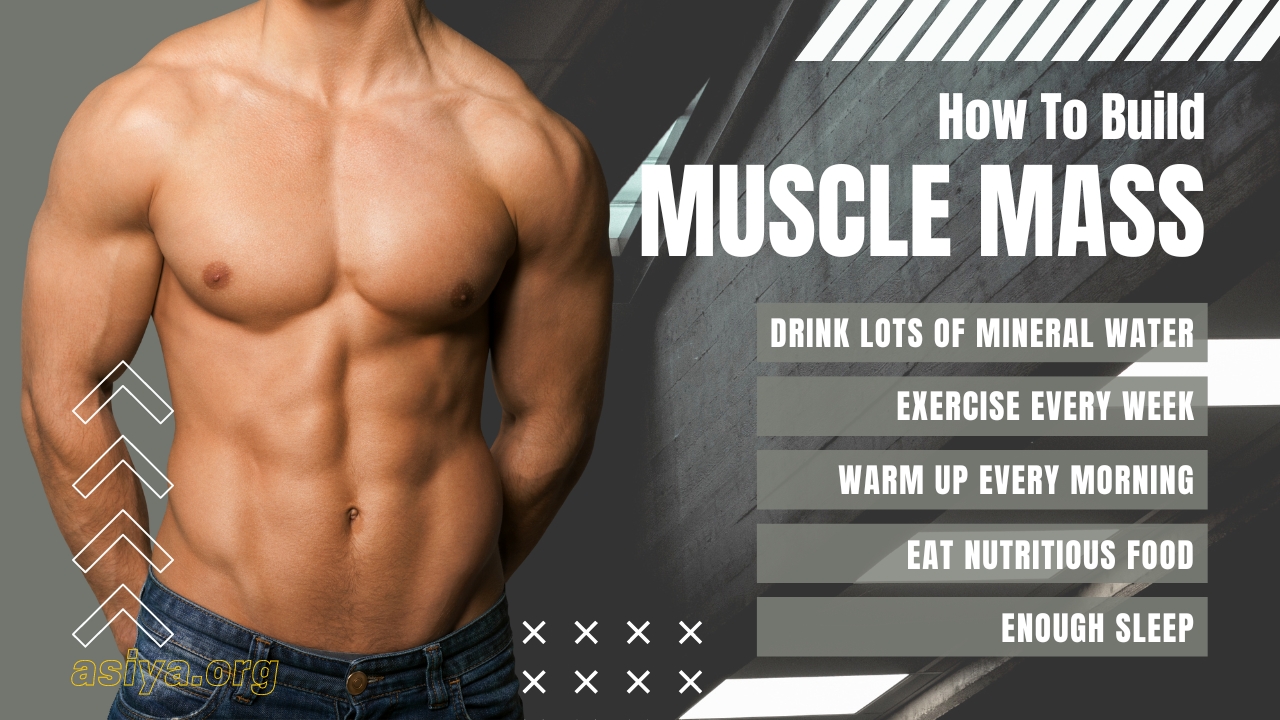Expert Guide to Muscle Building
Building muscle is a journey that combines discipline, hard work, and smart strategies.
According to experts, it’s not just about lifting weights but adopting a holistic approach that encompasses nutrition, exercise, recovery, and consistency.
Muscle building is beneficial not only for enhancing physical appearance but also for improving overall health, including increased metabolism, better joint health, and improved endurance.
Experts advocate for a balanced strategy that prioritizes proper technique, adequate nutrition, and rest, ensuring that the efforts at the gym translate into visible and sustainable muscle growth.
This article will guide you through the expert-endorsed roadmap to building muscle effectively, covering everything from the science of muscle growth to practical tips on diet and exercise.
Understanding Muscle Growth
Muscle growth, or hypertrophy, is the process of increasing muscle size through a combination of exercise, nutrition, and rest.
According to experts, the primary mechanism behind muscle growth is the response of muscle fibers to resistance training.
When muscles are subjected to stress, such as lifting weights, micro-tears occur within the muscle fibers.
The body repairs these tears during recovery periods, leading to muscle growth.
This process is enhanced by two key factors: mechanical tension and metabolic stress.
Mechanical tension involves the force exerted on muscles during exercises, especially when performing lifts at a significant portion of your one-repetition maximum (1RM).
This tension stimulates muscle repair and growth by activating muscle satellite cells, which are essential for adding new muscle tissue.
Metabolic stress occurs during high-rep, lower-weight training, leading to a buildup of metabolites like lactate.
This stress contributes to muscle growth by increasing cell swelling and activating anabolic pathways that promote muscle repair and growth.
Experts emphasize the importance of a balanced approach that includes both types of training stress to maximize muscle growth.
Progressive overload, gradually increasing the weight or resistance over time, is crucial for continued improvement and avoiding plateaus.
This ensures that muscles are consistently challenged, fostering an environment conducive to growth.
In addition to exercise, proper nutrition and adequate rest are paramount.
Nutrients provide the building blocks for muscle repair, you can learn more about it here, while rest allows the body to recover and grow stronger.
Thus, understanding the science of muscle growth is the first step towards developing an effective muscle-building routine.

Nutritional Strategies for Muscle Gain
Nutrition plays a pivotal role in muscle building, with experts highlighting the importance of protein, calorie surplus, and nutrient timing.
To support muscle growth, your body requires more energy than it expends, alongside sufficient protein to repair and build muscle tissue.
Protein Intake: Protein is the building block of muscle.
A general recommendation is to consume 1.6 to 2.2 grams of protein per kilogram of body weight daily.
High-quality protein sources include lean meats, fish, dairy, legumes, and plant-based proteins.
Distributing protein intake evenly throughout the day can also enhance muscle protein synthesis, an essential process for muscle growth.
Calorie Surplus: To build muscle, you need to consume more calories than your body burns.
This surplus supports the body’s recovery and muscle-building processes.
An additional 250 to 500 calories per day is often recommended, but this can vary based on individual metabolism and activity level.
It’s crucial to source these extra calories from nutritious foods rather than empty calories, focusing on a balance of carbohydrates, proteins, and healthy fats.
Nutrient Timing: The timing of nutrient intake can influence muscle recovery and growth.
Consuming protein and carbohydrates before and after workouts can improve muscle protein synthesis and replenish energy stores.
For example, a post-workout meal or snack containing both protein and carbs can significantly enhance recovery and growth.
Experts stress the importance of hydration, as water plays a crucial role in nutrient transport and muscle function.
Additionally, while focusing on protein, it’s essential not to overlook the importance of a varied diet rich in vitamins and minerals, which support overall health and muscle building.
Effective Training Principles
Building muscle efficiently requires more than just lifting weights; it demands adherence to proven training principles.
Experts emphasize the importance of progressive overload, training volume, and recovery in designing an effective muscle-building program.
Progressive Overload: The cornerstone of muscle growth, progressive overload, involves gradually increasing the demands on the musculoskeletal system.
This can be achieved by increasing the weight, changing the number of repetitions or sets, adjusting the tempo, or modifying the rest periods between sets.
The goal is to continually challenge the muscles, forcing them to adapt and grow stronger over time.
Training Volume: Volume refers to the total amount of work performed in a session, calculated as sets x reps x weight.
Research suggests a positive relationship between volume and muscle hypertrophy, with a recommendation to aim for a volume that allows for consistent progress while managing fatigue.
Balancing volume is crucial, as too little may not sufficiently stimulate growth, and too much can lead to overtraining and injury.
Recovery: Recovery is equally critical to muscle growth as the workout itself.
Muscles need time to repair and grow after being subjected to the stress of training.
Experts recommend allowing 48 to 72 hours of recovery time for each muscle group before targeting it again.
Adequate sleep, typically 7-9 hours per night, and active recovery techniques, such as light exercise or mobility work, can enhance recovery processes.
Diversity in Training: Incorporating a variety of exercises, including compound movements (like squats, deadlifts, and bench presses) and isolation exercises (such as bicep curls and leg extensions), ensures comprehensive muscle engagement.
Compound movements are particularly effective for building overall strength and muscle mass due to their recruitment of multiple muscle groups.
Experts also advise paying attention to form and technique over lifting heavier weights, as improper form can lead to injuries and hinder muscle growth.
Listening to your body and adjusting your training program based on feedback and progress is essential for sustained muscle development.

Supplementation for Muscle Building
While a well-balanced diet should always be the foundation of your nutrition plan, supplements can play a supportive role in muscle building.
Experts agree that certain supplements can enhance performance, recovery, and muscle growth when used in conjunction with a proper diet and exercise regimen.
Creatine: Widely researched and supported, creatine monohydrate is known for its effectiveness in increasing muscle power and endurance, allowing for more intense training sessions and faster muscle growth.
It aids in the regeneration of ATP (adenosine triphosphate), the primary energy source for muscle contractions, leading to improved performance and accelerated muscle recovery.
Whey Protein: Whey protein is a fast-digesting protein that supports muscle repair and growth by providing a high-quality source of protein immediately after workouts.
It’s particularly beneficial for its convenience and ability to quickly supply muscles with the necessary amino acids for protein synthesis.
Branched-Chain Amino Acids (BCAAs): Comprising leucine, isoleucine, and valine, BCAAs are essential amino acids that support muscle recovery, reduce muscle soreness, and promote muscle protein synthesis.
While BCAAs are found in protein-rich foods, supplementation can be beneficial, especially around workouts.
Experts caution against relying solely on supplements for muscle growth, emphasizing that they should complement, not replace, a nutritious diet and consistent training program.
Quality and dosage are important to consider, and it’s advisable to consult with a healthcare provider before starting any new supplement regimen.
Common Mistakes to Avoid
Achieving muscle growth is a complex process that requires attention to detail in both training and nutrition.
Experts highlight several common pitfalls that can hinder progress:
Overtraining: More is not always better.
Excessive training without adequate rest can lead to injury and burnout, negatively impacting muscle growth.
Listen to your body and ensure sufficient recovery time.
Neglecting Nutrition: Skipping meals or not consuming enough protein and calories can sabotage muscle-building efforts.
A consistent, balanced diet is crucial for providing the energy and nutrients necessary for recovery and growth.
Ignoring Compound Movements: Focusing solely on isolation exercises without incorporating compound movements can limit overall muscle gains.
Compound exercises, like squats and deadlifts, are foundational for building strength and mass.
Inconsistency: Skipping workouts or frequently changing routines without giving them a chance to affect can impede progress.
Consistency in training and nutrition is key to achieving long-term muscle growth.
Neglecting Sleep: Underestimating the importance of sleep can hinder recovery and muscle growth.
Aim for 7-9 hours of quality sleep per night to support recovery processes.
Conclusion
Building muscle is a journey that combines the science of nutrition, the discipline of training, and the art of recovery.
By understanding the biological mechanisms of muscle growth, adhering to nutritional best practices, following effective training principles, considering supplementation, and avoiding common mistakes, you can set the foundation for sustainable muscle development.
Remember, consistency is more critical than perfection, and small, steady progress over time leads to significant results.
Always listen to your body, and don’t hesitate to adjust your plan based on your progress and feedback.
Building muscle is not just about enhancing your physique—it’s about embracing a lifestyle that prioritizes health, strength, and well-being.
With patience, persistence, and the guidance of experts, you can achieve your muscle-building goals.




 This course shows you how to overcome paralyzing fear and pursue your life's dreams. Conquer insecurity and enhance your performance in every area of life.
This course shows you how to overcome paralyzing fear and pursue your life's dreams. Conquer insecurity and enhance your performance in every area of life.